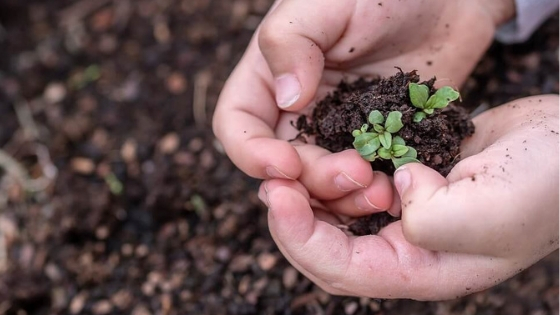Jesus’ parable in Luke 8:4-15 called the parable of the sower is about the receptivity of the human heart. Matthew called this “the parable about the farmer planting seeds” (Matthew 13:18 NLT), but it could also be called “the parable of the types of soil.”
The human heart is like the soil in this parable: If it is prepared properly, it becomes fertile and can receive the seed of the Word of God and produce a fruitful harvest. Now, the question you may want to ask yourself is: “How fertile is my heart?”
Hearing Means Listening
Notice how the word “hear” is used several times in Luke 8:11-15. It means much more than simply listening to the words. “Hearing” means listening with spiritual understanding and receptivity. It is a serious thing to hear and understand the Word of God because this puts on us the obligation to share that Word with others.
Everyone who receives the seed then becomes a sower, a light bearer, and a transmitter of God’s truth (1 Thessalonians 1:5-8). If we keep it to ourselves, we will love it, but if we will share it, we will receive more.
4 Different Kinds of Hearts
In the parable, Jesus described 4 different kinds of hearts, 3 of which did not produce any fruit. Let us not forget that the proof of salvation is fruit and not merely hearing the Word or making a profession of faith in Christ. Jesus had made that very clear in His “Sermon on the Mount” in Luke 6:43-45. (See also Matthew 7:15-20.)
A. The hard soil – Luke 8:5, 12
This soil represents the person who hears the Word but immediately allows the devil to snatch the seed away. How did the heart become hard? The “footpath” or “wayside” was the path that ran through the common field, separating the plots, and the foot traffic hardened the soil.
“Whatever goes into the ear or eye finally enters the heart, so be careful who you allow walking on your heart.”
B. The shallow (rocky) soil – Luke 8:6, 13
This soil illustrates the emotional hearer who quickly responds to the message, but his interest wanes and he does not continue (see John 8:31-32). In many parts of the Holy Land, you find a substratum of limestone covered with a thin layer of soil. The shoot can grow up, but the roots cannot go down, and the sun withers the rootless plant.
*Read here: The Christian’s Response to Trials
The sun represents the testing that comes to all professing believers to prove their faith. Sun is good for plants if they have roots. Persecution can deepen the roots of a true Christian, but it only exposes the shallowness of the false Christian.
C. The crowded (thorny) soil – Luke 8:7, 14
This soil illustrates the person who does not repent and “weed out” the things that hinder the harvest. There is enough soil so the roots can go down, but not enough room for the plant to grow up and produce fruit. The plant is crowded out and the fruit is choked.
“Cares, riches, and the pleasures of this life” are like weeds in a garden that keep the soil from being fruitful. The person with a “crowded heart” comes closest to salvation, but he still does not bring forth “fruit to perfection.”
D. The good (fertile) soil – Luke 8:8, 15
This soil alone is fruitful. It illustrates the individual who hears the Word, understands it, receives it within, is truly saved, and proves it by patiently producing fruit (see 1 Thessalonians 2:13 & 1 Peter 1:22-25).
*Not everybody produces the same amount of fruit (Matthew 13:8), but all true believers will produce some fruit as evidence of spiritual life. That fruit may include winning others to Christ (Romans 1:13), money given to God’s work (Romans 15:25-28), good works (Colossians 1:10, Christian character (Galatians 5:22-23), and praise to the Lord (Hebrews 13:15).
Closing Thoughts
Why compare God’s word to seed? Because the Word is “alive and powerful” (Hebrews 4:1). Unlike human words, the Word of God has life in it, and that life will be imparted to those who will believe.
When you consider how much teaching, preaching, and witnessing goes on in the course of a month or a year, you wonder why there is such a small harvest. The fault does not lie with the sower or the seed. The problem is with the soil – the human heart.
In order for the truth of God to take root in the heart, be cultivated, and be permitted to bear fruit, the heart must, first of all, be fertile. Sadly, many human hearts will not submit to God, repent and receive the word and be saved.
To which category does your heart belong? Hard, shallow, crowded or good? And if you say your heart is good or fertile, how fertile is it?
*Create your own Christian website for free like I did and share the love of God to the world, His goodness and faithfulness in your life. My recommended training platform will show you how to do that step by step.


Hi Alice!
I love the way you compared the word of God to a seed because it is “alive and powerful”. In all the types of soil mentioned which represent the different types of people, the seed which represents the word of God has been brought to life because the word of God is alive. However, it has not nourished in others because their hearts are not truly submitted to God.
Thank you for your wonderful and very informative article. God bless you more!
Yes indeed, in the parable of the sower, the Word of God is like a seed that is planted in 4 different types of soil – that is the heart. That “seed” is alive and it can grow depending on the receptivity or fertility of the heart.
Thanks for stopping by Bro. Jess, God bless you!